An Interview with Samuel Hartman, RKC Instructor
by Adrienne Harvey SrPCC, RKC-II, CK-FMS, Primal Move Nat'l Instructor
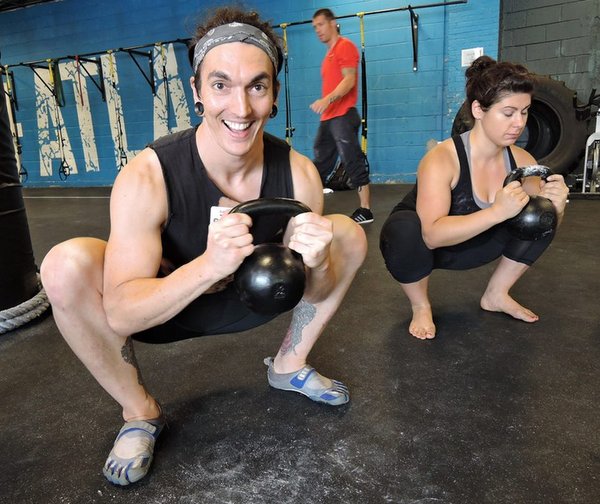
Dragon Door: What is your athletic background?
Samuel Hartman: Like many people, I started out as a runner. After graduating from college, I wanted to get in shape and it's kind of a cliché, but I decided I should just go run for exercise. I got decent at it, and was consistently doing eight-minute miles and having a good time until I injured myself as a lot of runners do. I became interested in weight training as a form of rehabilitation, and began to love lifting heavy things.
Then I transitioned to road cycling and started racing a lot in category three road racing. Next I moved on to a different type of weight training that was more focused on powerlifting. CrossFit led me to try Olympic weightlifting, which I’m focusing on right now along with kettlebells. Part of my inspiration to attend the
RKC workshop was the desire to help others in CrossFit with their kettlebell form on swings, snatches, and get-ups. I want to teach people how to keep their shoulder in the socket, how to not overextend, and other techniques.
Dragon Door: How did you first find out about kettlebells?
Samuel Hartman: I originally found out about them 7 years ago (2007) through a friend of mine, an RKC trainer who worked at the gym where I trained. I saw kettlebells at the gym, but didn't know why or how to use them. The gym offered free classes with Demond Thompson, who I have since lost touch, but maybe he will see this and contact me! Over a period of several months, he very slowly and carefully taught a lot of kettlebell moves to the class and instilled an appreciation of the power of kettlebells. Because he was a fan of Dragon Door, I ordered my first kettlebell from Dragon Door several years ago. Since then, no matter what sports I’m involved with, I always have a kettlebell around. I even bring them with me when I travel. I think
kettlebells are great tools.
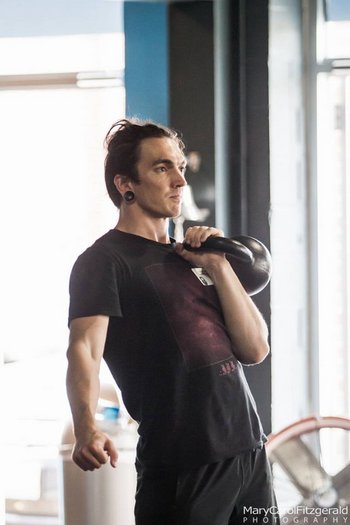
Dragon Door: Are you leading classes of your own or training clients now?
Samuel Hartman: I have one kettlebell class right now, occasionally train my friends, and try to help people in the gym. I also have a USAWL Level 1 certification and I am considering more education and certifications. Part of my decision to do the RKC was to feel more confident when helping people.
I feel like the RKC not only showed me how to use kettlebell properly, but also taught me certain movement patterns that are really powerful.
Dragon Door: What were you most inspired by at the RKC Workshop?
Samuel Hartman: The weekend was really incredible. As a "people person" in jobs, life and relationships, people motivate me the most. When I train people, I try to make a real connection with them so I can understand them better. In every gym, there's a certain vibe that comes with the people. At the certification, I can say with 100% certainty that everyone was dedicated and motivated to learn the material and how to teach it. This was an incredibly inspiring way to learn. It's one thing to be in a class where all or some of the people don't want to be there. With my background in teaching in math and science to people young and old, I know when someone does or does not want to be in a class.
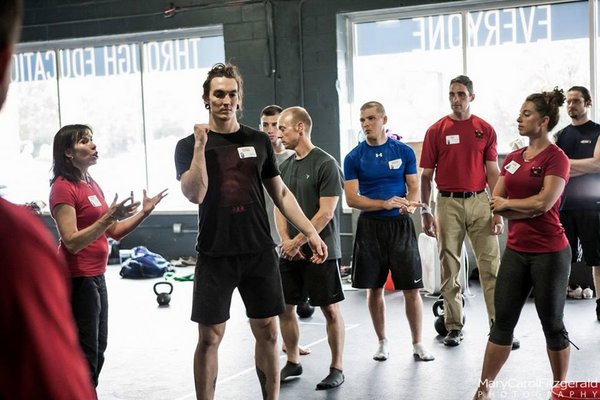
The RKC weekend was not easy—it's hard, and at one point I was frustrated to find out that I’d been practicing a technique incorrectly for the past five years and had to change it! But it was incredible to watch everyone’s dedication to learning the techniques, and working hard. During the group workouts, no one complained or sat out because they were tired. I was impressed with the
quality people that the RKC attracts. They work hard, want to learn, and understand the necessary discipline. That was one of the most inspiring things to me about the weekend.
Dragon Door: What's your favorite kettlebell move?
Samuel Hartman: The kettlebell snatch because it's a full body movement, and once you dial in the technique, it is so much fun. I spent a lot of time working on it since I ended up failing the
snatch test during the weekend. I was extremely motivated to pass it, and did just a few days ago on video. While you need to learn technique to be safe with it, once you get it, it is just so powerful. It's aerobic, anaerobic, strength, cardio, and it just looks cool! It's a really neat way to move a kettlebell overhead.
Dragon Door: What happened when you took the test at the workshop?
Samuel Hartman: At first I failed the test because my grip failed around rep 80—and I hadn’t had a kettlebell come out of my hand like that in five years! I was pretty bummed, but think it was just due to fatigue and because I should have switched hands sooner. If you take the test and fail—acknowledge the sadness, then take the test again later when you’re ready—you have three months to take the test again. It's hard to pass it at the weekend—30 percent of the people fail, and I was part of that 30 percent!
But I was really motivated, so after a week of light training, I went to a friend’s gym that had kettlebells and we recorded it. I was proud of passing it at 4:55 since I had also run out of time before.
Dragon Door: Are you still teaching math and science?
Samuel Hartman: Yes, I'm currently moving from Louisville to near Cleveland where I just accepted a position at Oberlin College. It's interesting how it worked out, I still want to do fitness training, but I have this other career path that's actually not teaching, but more about technology and sustainability. There’s a lot of computer programming involved, and I am very excited about it, but it sort of changes my game plan.
Prior to this, I was tutoring kids who needed help over the summer or adults who wanted to pass the GRE. I always want to educate and inspire people, and it’s the same with kettlebells. The knowledge from the RKC has given me confidence when I teach kettlebells at the gym. I am able to get the points across, and now have all the information to back it up with everything I learned from
Andrea Du Cane, and the manual. I felt that the certification was hard but fair, and I loved being a part of it. Andrea did a great job of being a strict but compassionate teacher.
Dragon Door: You have a lot going on! On your Facebook page, I noticed that you also play keyboards and saxophone in a metal band.
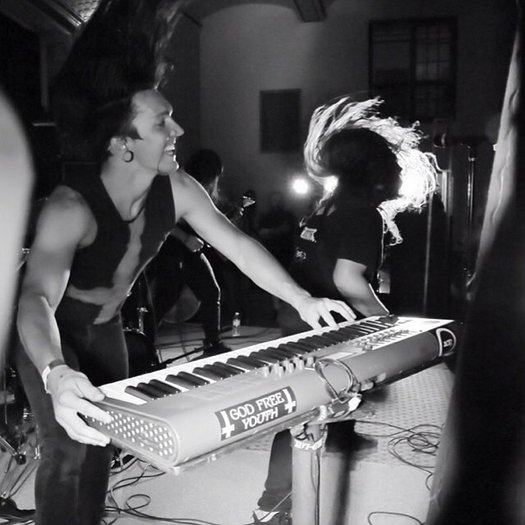
Samuel Hartman: Yes, and you'll hear both on our most recent album. And it’s crazy, but at the RKC certification, I found not one but two people who were also into crazy extreme metal like I am! It was really cool that there was a great diversity of people at the certification. I think that Dragon Door and the RKC has changed a lot in the past few years and has become attractive to people from all walks of life.
Dragon Door: Having conducted a number of
interviews, I've noticed that there are quite a few musicians among RKC instructors. One theory is it’s because they know the value of practice. What do you think?
Samuel Hartman: I know a fair amount of musicians who are also into fitness, but I also know a lot of musicians who definitely are not. Metal especially tends to be a fairly decadent genre, and I am kind of an outlier since I don’t partake of any substances or alcohol. But I think that understanding dedication and practice is certainly a solid theory to kind of connect fitness and musicians.
At the workshop, [Instructor]
Nick Lynch and I talked a lot about metal and kettlebells. We also discussed the enjoyment of music beyond just listening to a song and liking it. If there's a level of intellectual appreciation of music, then there's usually some desire to play music and not just listen to it. And to truly understand kettlebell training, you can't just throw them around, you have to intellectually appreciate them—their history, the techniques, and how these techniques can apply to other fitness modalities. There's a philosophy behind it, and I think similar principles attract people to music—especially if they want to play it.
Dragon Door: Now that you’re a certified RKC Instructor, what's your next goal?
Samuel Hartman: I will continue to train with kettlebells, especially since now that I know I am doing it the right way! Now when I practice swings, I use my hips and breathe correctly. I changed so much in three days, and feel really confident about it. My athletic goals right now are focused on training for an Olympic weightlifting competition in Ohio this October. And I plan to use kettlebells for supplementary accessory work on 2 of my 5-6 training days. With kettlebells, I hope to emphasize core strength, breathing, increased mobility, all while developing and maintaining a baseline of cardiovascular health. Instead of running for 6 miles, I can just do intervals of snatches for 10 minutes.
I'd also like to train more private clients with kettlebells. A kettlebell is a wonderful tool. They are very safe to use and great for people who are starting out because
you can teach so much with them—deadlifts, swings, cleans, really a whole arsenal of exercises. Kettlebells are so portable that you can show up anywhere with them. You don’t need shoes, a gym, gloves, or anything else!
Dragon Door: How did you decide to attend the RKC?
Samuel Hartman: It had been on my radar for about six months. I had been looking at several different certifications after completing the USAW Level 1 including CrossFit certifications, other kettlebell certifications, and some of the other programs like the
PCC from Dragon Door. I met with
Garrett Watson, an RKC instructor in Louisville, and trained with him for a couple of days because I wanted to learn more about kettlebells and maybe about teaching. I asked him about the about the workshop, and if it was fun. He said it wasn't fun, but that it was a difficult challenge. Something about his answer inspired me—I wanted a challenge. I wanted to go to a certification workshop that's actually hard to the point that I'd have to work to achieve it.
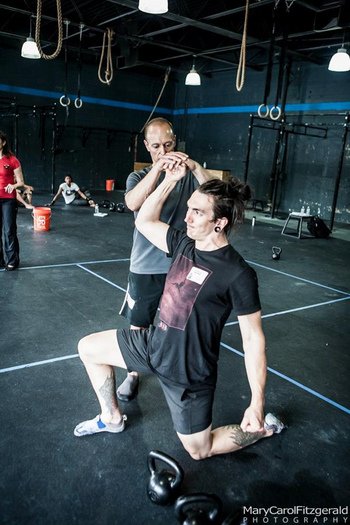
I found that challenge at the RKC. The workouts were humbling, and the focus on technique was extremely humbling because of how specific Andrea and the team were about the movements. Every little part of the body needed to be in the right place for a rep to count. That's what really attracted me to the RKC workshop—knowing that it would be difficult, and would challenge me. I liked how the workshop was focused on techniques, principles, and standards.
Dragon Door: Kettlebell training can be very mental too, which is sometimes a surprise, but ultimately rewarding.
Samuel Hartman: One thing I like about anything freeweight-centric, particularly kettlebell training is how you really have to be present during a workout. It’s a huge issue for everyone—we're always anxious about the past, or thinking about the future instead of being in the present moment. One of the things I like about lifting is that it forces me to be in the present moment.
Being straightedge, I don't do any recreational drugs at all, and when I took that snatch test—essentially five minutes of all-out effort—I wondered what feeling could possibly beat it! Why would anyone take substances when they could train their body to do this? Doing snatches with a
24kg kettlebell for five minutes straight is an unparalleled feeling!
Training the mind as intensely as the body really interests me in fitness. I think that's why I started to get involved with fitness more as I moved through life, it keeps me focused, present, and can make me stronger all around—not just in the gym, but in life. Fitness is so powerful, it teaches dedication, discipline, makes you feel better and gives you confidence.
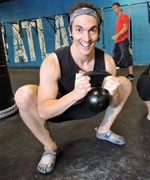 Sam Hartman trains at a variety of CrossFit gyms across the Midwest and is always interested in taking on new clients. You can reach him via e-mail at samueljhartman@gmail.com, or on Twitter, @sam_metal. Visit his band at http://anagnorisis.com.
Sam Hartman trains at a variety of CrossFit gyms across the Midwest and is always interested in taking on new clients. You can reach him via e-mail at samueljhartman@gmail.com, or on Twitter, @sam_metal. Visit his band at http://anagnorisis.com.
Back